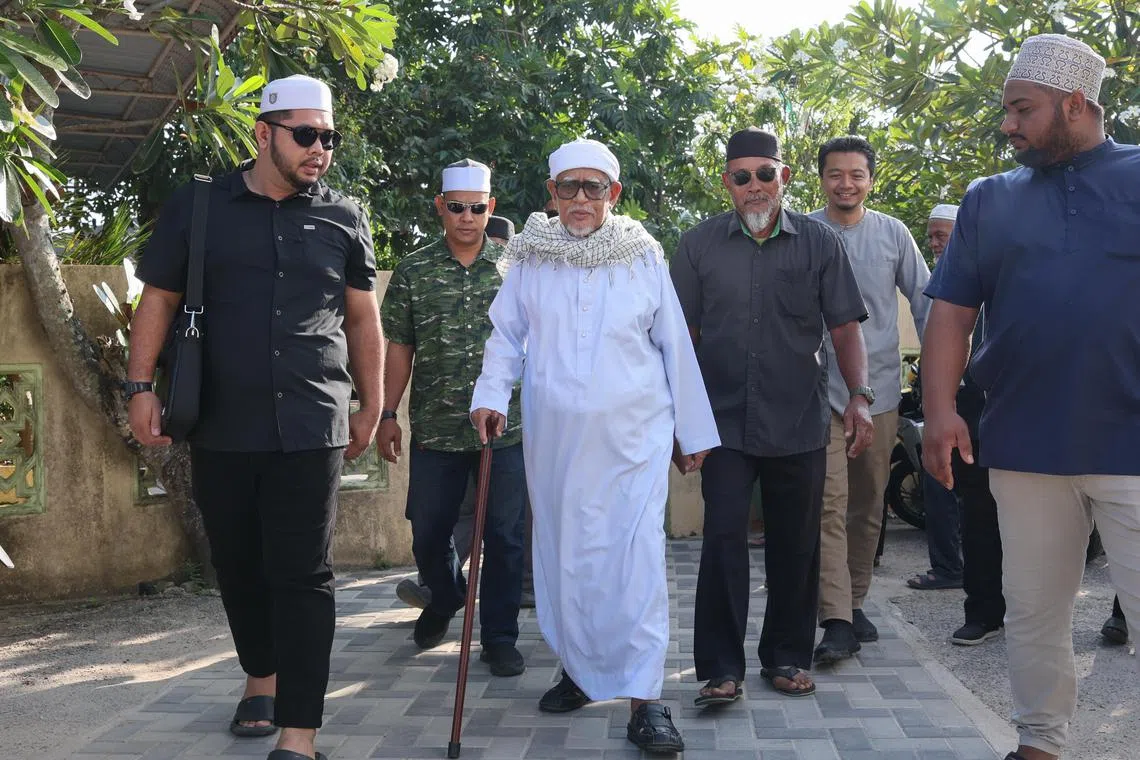News analysis
If it ain’t broke, why fix it: Top PAS leaders set to retain posts at Islamist party’s congress
Sign up now: Get insights on the biggest stories in Malaysia

Despite concerns about 77-year-old president Hadi Awang’s (centre) ailing health, he is likely to lead PAS’ charge for a sixth GE.
PHOTO: BERNAMA
- PAS's top five leaders, including president Hadi Awang, will remain unchallenged at the upcoming annual congress, ensuring stability.
- Analysts say this stability aims to consolidate gains from the 2022 general election, where PAS became the largest party.
- Despite efforts to attract non-Muslims, PAS's Islamist ideology still limits broader appeal and national leadership aspirations.
AI generated
KUALA LUMPUR – Over the past decade, the opposition Parti Islam SeMalaysia (PAS) has largely escaped the turbulence that beset other Malaysian parties as their succession plans unfolded – or unravelled.
PAS’ top two leaders have held their positions unopposed since 2015, and the status quo looks set to remain as party delegates convene for their annual congress in Alor Setar, Kedah, from Sept 11 to 16.
Instead, all eyes will be on the messaging throughout the six-day congress, or muktamar as the Islamist party calls it.
Ahead of Malaysia’s 16th general election due by early 2028 but possibly as soon as 2026, PAS is expected to outline how it intends to court non-Muslim voters, and how its allies within the Perikatan Nasional (PN) coalition – as well as a recently formed loose pact with other opposition parties – can aid it to do so.
Despite concerns about 77-year-old president Abdul Hadi Awang’s ailing health, he is likely to lead PAS’ charge for a sixth general election.
Former minister Tuan Ibrahim Tuan Man will extend an already decade-long stint as Tan Sri Hadi’s deputy, and the same three vice-presidents will remain in place for a third term since 2021.
There was a brief moment when a contest looked possible as vice-president Nik Amar Abdullah was nominated by one of the party’s divisions to contest the No. 2 post in June 2025.
Kedah Chief Minister Sanusi Md Nor threw his hat into the ring for the vice-president post but withdrew later.
Other positions – such as the entire leadership of the powerful ulama wing of religious scholars and the top three positions in the youth and women’s wings – will not be contested following similar withdrawals announced by secretary-general Takiyuddin Hassan on Aug 30.
Mainly, it is a reflection of the discipline of its grassroots and influence of the ulama faction, which Mr Hadi leads. Analysts say that maintaining the status quo positions PAS on a path of stability to continue its upward trajectory.
This stability previously brought the party record gains in the 2022 polls, when PAS won 43 seats in Parliament
The Islamist party was propelled to power at the federal level when it joined PN in 2020.
It has benefited from an exodus of Malay support from the long-ruling Umno, which was beset with corruption scandals. These voters landed predictably with PN, in large part due to PAS’ Islamic credentials and pro-Malay stance.
PAS also deepened control in three of the four northern states it governs in the 2023 state elections – Kelantan, Terengganu, and Kedah. And it made inroads into three others held by Prime Minister Anwar Ibrahim’s Pakatan Harapan (PH) coalition.
This leadership stability is in contrast to the rancorous internal schisms in the multi-coalition Anwar administration, which has taken flak in recent months, especially on economic and ethnic issues.
“It reflects a broad consensus on PAS’ political approach thus far – one that has led PAS to historic performances at the 2022 GE and 2023 state elections,” S. Rajaratnam School of International Studies’ Malaysia programme coordinator Ariel Tan told The Straits Times.
“Internally, the party has not, arguably, quite recovered from the talent void left since the schism of 2015, and there is neither appetite nor motivation for leadership challenges in a now more unified party.”
In 2015, a bitter internal election resulted in the so-called “Erdogan” faction – named after Turkish leader Recep Tayyip Erdogan – being defeated and eventually splintering to form Parti Amanah Negara, now a PH component.
In comparison, Umno has sacked or suspended
Datuk Seri Anwar’s Parti Keadilan Rakyat (PKR) has also suffered multiple schisms since 2020, losing successive deputy presidents – Datuk Seri Azmin Ali in February that year and Datuk Seri Rafizi Ramli
Even PAS’ partner in the opposition PN, Parti Pribumi Bersatu Malaysia, is showing signs of an uprising against president Muhyiddin Yassin, with delegates scuffling during the former premier’s opening speech at a Sept 6 general assembly.
Thus, in lieu of top leadership contests, PAS may instead ruminate on how it plans to broaden its appeal
In 2023, Mr Hadi himself admitted that a key weakness was the antipathy from non-Muslim Malaysians towards PAS.
At its muktamar in 2024, PAS even approved constitutional amendments
But such moves are widely regarded as “superficial”, according to Universiti Sains Malaysia’s social sciences expert, Associate Professor Azmil Tayeb.
According to Prof Azmil, PAS’ Islamist ideology continues to sow fears of a possible theocracy, despite its denials.
He suggested that this is largely why, despite its relative success, PAS still cedes the leadership of the PN coalition – and along with it any claims to the premiership – to the smaller Bersatu, which is seen as a more centrist Malay party in the mould of the long-ruling Umno.
“Its Malay votes are almost maximised. But if PAS harbours national aspirations and to outdo its performance in the last election, it needs to expand its voter base,” Prof Azmil told ST.
Currently, only Terengganu Chief Minister Samsuri Mokhtar, a sitting vice-president, appears to be an acceptable leader
Nonetheless, PAS will be happy to play the waiting game in its long trek to Putrajaya, risk consultancy Viewfinder Global Affairs managing director Adib Zalkapli told ST.
“They waited for more than half a century to have their first elected representative in Selangor, the most urban and progressive state.
“PAS can wait longer to convince people to accept ulama leadership for Malaysia because it’s not just a political party – it’s an Islamic movement.”



